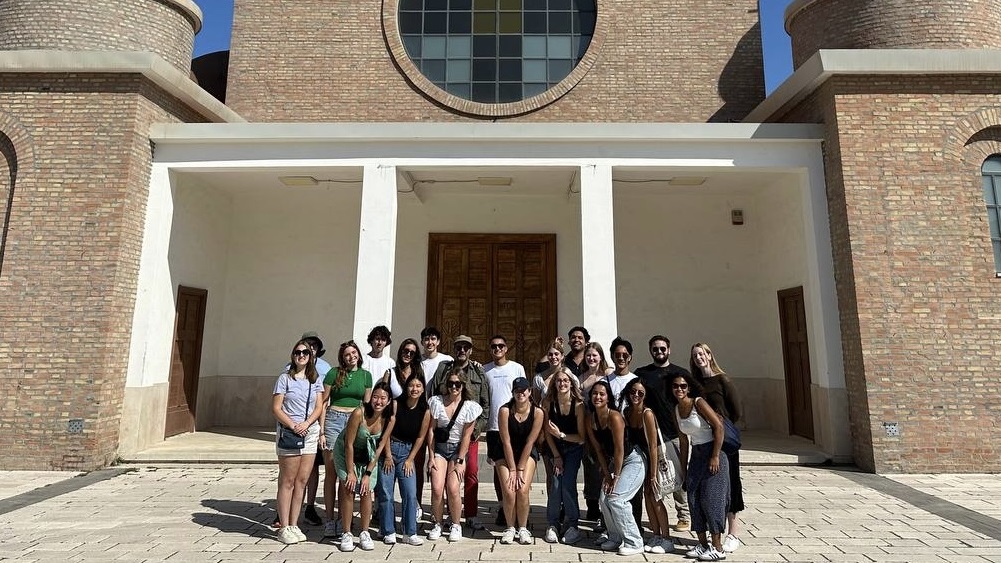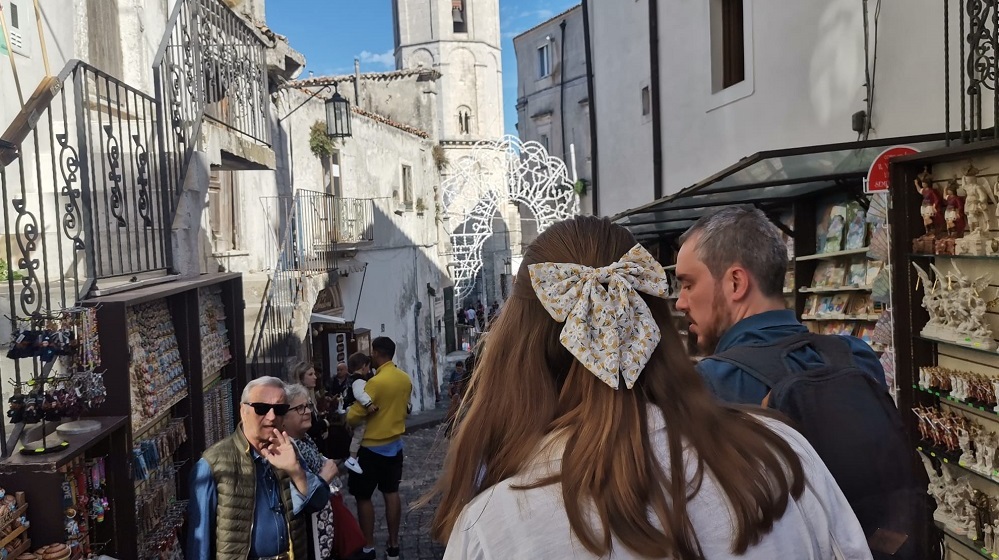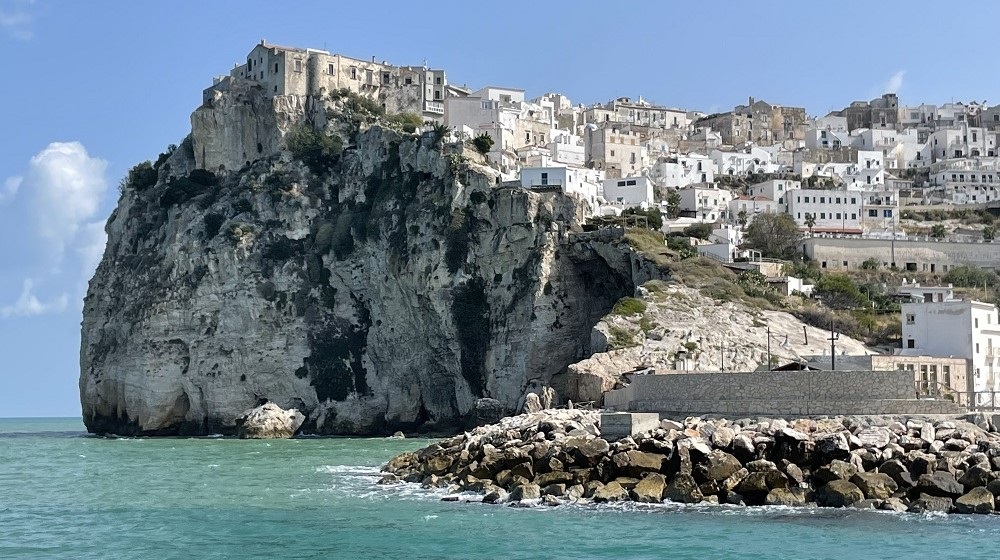Hospitality and hardship: The two sides of food in Puglia

Student group in front of church in Borgo Mezzanone during study trip
During the fall semester, Resident Director Jack Spittle and Assistant Resident Director Amir Speranza Salameh accompanied a group of students on a three-day odyssey through the beauty and culture of Puglia, as well as discussing some its pressing human rights concerns. LUC junior, Madelaine Brix, wrote this reflection on her experience in one of Italy’s most tantalizing regions. Brix hails from Wisconsin and is studying visual communications, classical civilizations and Spanish.
Apulia, or as many people call it, Puglia, is the region in Italy which forms the peninsula’s “heel”. It is a vast and diverse region; lonely masserias stand above endless farmland, whitewashed villages on cliffs overlook the bright Adriatic Sea, and tiny settlements lay nestled in the ancient forests of the Gargano Mountains. Perhaps most importantly, Apulia is a region inextricably tied to food production.
Puglia produces monumental quantities of durum wheat, tomatoes, table grapes, and olives that are exported to the rest of Italy and all over the world. Yet, despite the richness of the land, the people are some of the poorest and most disenfranchised in the country. As is disappointingly common around the world, those who work to grow and make our food are left to scrape by while massive corporations reap the profits.

It is not only native Italians who suffer; migrants from Africa and Asia flock to the region hoping for honest work and a better life, but wind up working the vast fields for a pittance and living in makeshift shantytowns, called ‘ghettos.’ The food culture of Puglia today is inextricably tied to its historical and current hardship, but the hospitality and kindness of the people we met here showed us that there was still much to be appreciated about the region and its food.
Food production is the driving force of the economy in Puglia, and for many is a way of life. About 1/3 of the tomatoes grown in Italy are grown in the region, specifically near Foggia where we were staying. There is a constant need for day laborers to work in the fields, attracting a large population of West African migrants to the area. We often drove by large fields of tomatoes being picked by migrant workers as we traveled around the region.
Early on, we visited the tiny town of Borgo Mezzanone, which we learned was built in the fascist period under Mussolini. It is also the location of a massive shantytown that houses thousands of migrant farmworkers in dangerous and unsanitary conditions. Here we met Gibson, a migrant from Senegal who worked as a farmhand and was a friend of our group leader Jack Spittle. Through him and Jack, we learned about the exploitation of migrant workers in local food production.
Despite laws regulating minimum wage and maximum working hours, migrants are paid a few euros per massive container they fill with the crop and are forced to work 10 or more hours in the blazing sun. To find work and be transported to job locations, migrants are forced to rely on gang masters, known locally as the caporali, who require 5 euros a day for their services, a huge amount for someone who may only early 10 or 15 euros. The systematic exploitation leaves migrants in destitution while the caporali and farm owners rake in the profits.
I had the opportunity to speak with Gibson at length while he traveled with us, and despite the horrible treatment he received as a farmhand and his living conditions in the ghetto, he radiated kindness and positivity. He spoke about his life, how happy he was to speak to us, and how he was pursuing an education in agriculture to better his circumstances. Gibson was an incredible person and helped us to tangibly grasp the exploitation that plagues the systems of food production in Puglia.

Thankfully, there are businesses and farm owners who pay their workers fair wages and treat them with respect. We were able to visit the processing plant of one of these businesses, Prima Bio, and were shown around by the owner, Maria Louisa. We were visiting right after the tomato harvest, so the entire factory was producing canned tomato products, though Maria explained that they process whatever vegetables are in season, including broccoli and asparagus.
Our group watched as the tomatoes were cleaned and sorted before being cooked and made into simple sauces. Maria explained that the tomatoes were grown organically and are processed the same day they were picked in order to maintain their freshness. It was fascinating to see how the tomatoes were processed, and refreshing to see the respect Maria showed the workers in the factory. Before we left, Maria invited us for a snack, and surprised us with a table full of charcuterie, cheeses, sun dried tomatoes and white melons. Despite none of us knowing exactly what the melon was, we thoroughly enjoyed it. Before leaving, Maria gave each of us two large jars of tomato sauce that had been produced while we were there, as well as over a dozen delicious white melons.

I learned during my time in Puglia, making food and giving it to others is how people are welcomed. During our stay, we not only received the sauces and melons from Maria, but also fresh olive oil from the owner of the masseria we were staying at, Angelica. Her hospitality and kindness was immediately apparent upon meeting her; despite arriving well past midnight on the first night of our visit, Angelica laid out a variety of cookies and pastries for us to try before showing us to our rooms. Her and her staff worked hard to provide us with the best meals possible, and truly went above and beyond on the final night of our stay. We were served four courses of delicious Apulian foods including orecchiette pasta with tomatoes and broccoli rabe, fresh mozzarella, and acquasale, a salad of sorts made by mixing cut up pieces of stale bread with olive oil and fresh vegetables. Everything was served with red wine produced locally in Lucera. The food Angelica served (and really all the food we had while in Puglia) was incredible.
By the end of our time in Puglia, I felt my understanding of the negative and positive aspects of food production had increased. I was, and still am, grateful to have visited this beautiful and complex region, and to experience its incredible food culture.
